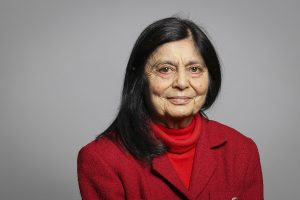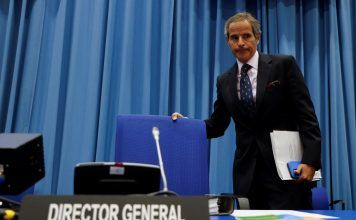By Kayhan Life Staff
The Right Honorable Baroness Afshar, a British life peer in the House of Lords and an emeritus professor of politics and women’s studies at the University of York, England, died on May 12, age 77.
Haleh Afshar was formally inducted into the House of Lords in December 2007, as Baroness Afshar of Heslington in the County of North Yorkshire. She was one of the 222 female peers in the House of Lords.
Baroness Afshar’s induction into the House of Lords was front-page news in many Iranian newspapers, including Kayhan London.
Ms. Afshar was awarded the Order of the British Empire (OBE) in 2005 for services to the cause of equal opportunity. She also received the Fellowship of the Academy of Sciences (FAcSS).
Haleh Afshar was born in 1944 in Tehran. At 14, she was enrolled in a boarding school in Solihull, West Midlands County, England. She later attended a college in Brighton, after which she enrolled at the University of York. After graduating with a BA from the University of York, Haleh Afshar received a PhD from Cambridge University.
After receiving her doctorate, Afshar returned to Iran and joined the civil service, working with the Ministry of Land Reform and as a journalist. She worked for the Tehran-based English-language Kayhan International before the 1979 Islamic Revolution.
Haleh Afshar’s father, Dr. Hossein Afshar, was a distinguished law professor at Tehran University’s law school. He was also a close friend of the late Dr. Mostafa Mesbahzadeh, the founder of Kayhan Publishing.
Afshar eventually returned to the UK, pursuing her academic and writing interests.
Haleh Afshar was an author whose extensive writings on Iran and Iranian politics appeared in academic journals and media publications worldwide.
Baroness Afshar wrote two books, “Islam and Feminisms: An Iranian Case Study” (Macmillan, 1998) and “Islam and the Post-Revolutionary State in Iran” (Macmillan, 1994). She also edited and co-edited 13 books on issues relating to women and development.
Baroness Afshar was a Visiting Professor of Islamic Law at the Faculté Internationale de Droit Comparée (international faculty of comparative law) at Robert Schuman University in Strasbourg, France. She also received honorary doctorates from the University of Essex in 2011 and the University of Bradford in 2017.
Baroness Afshar served on the editorial boards of dozens of academic journals. She was also a member of the advisory group to help the development of an Economic and Social Research Council (ESRC), part of UK Research and Innovation (UKRI), a non-departmental public body (NDPB) funded by the UK government.

Source: https://members-api.parliament.uk/api/Members/3847/Portrait?cropType=ThreeTwo/
Gallery: https://members.parliament.uk/member/3847/portrait/
Author: Roger Harris/Creative Commons Attribution 3.0 Unported license
Haleh Afshar was a member of several advisory and research groups, including the UK-based charity Joseph Rowntree Foundation (JFR) research project on “Muslims and Community Cohesion in Britain” and UKRI’s 2006 Economic and Social Research Council (ESRC) Working Group on religion and ethnicity.
In 2006, Afshar also became a member of the advisory group of the UK-based Arts and Humanities Research Council (AHRC) and ESRC, working on a joint research project on religion, belief, and society.
Two years later, Afshar worked as a member of an Advisory Group for the “Integration of female immigrants in labor and society” research program, part of the European Commission’s 2006-2008’s 6th Framework Program.
In 2007 and 2008, Afshar represented ESRC in the British Academy (UK’s national academy for humanities and social sciences) and the Visiting Fellowships Scheme Panel for the Middle East.
In September 2008, Afshar was appointed to the Women’s National Commission board. She also served as the honorary president of the International Services of the British Council and the United Nations Association, and the British Society for Middle Eastern Studies chair.
Afshar was also a founding member of the UK-based Muslim Women’s Network and served on the UK Home Office’s working groups to “engage with women” and “prevent extremism together.”
Afshar served for seven years as Deputy Chair of the British Council’s Gender and Development Task Force and was a member of the Advisory Group of the Cabinet Office’s Women’s Unit to work on raising gender awareness amongst civil servants who adjudicate applications for asylum from women.
In 2008, Afshar served as a commissioner of the UK government’s Women’s National Commission. She also served as a member of the Nuffield Council on Bioethics working group on ethics and pharmacogenetics.
In March 2009, the Muslim Women Power List 2009 named Baroness Afshar one of the UK’s twenty most successful Muslim women. The Equality and Human Rights Commission (a non-departmental public body in England and Wales), the UK lifestyle Emel Magazine (contemporary British Muslim culture), and The Times compiled the list to celebrate the achievements of Muslim women in the UK.
Kayhan London and Kayhan Life extend their heartfelt sympathy and deepest condolences to Baroness Afshar’s family, friends and colleagues.





